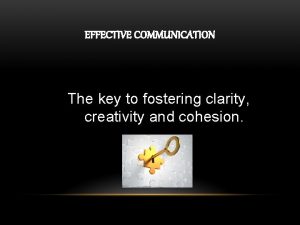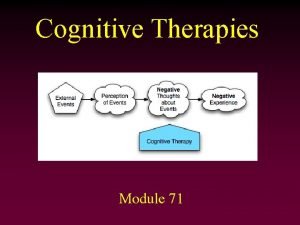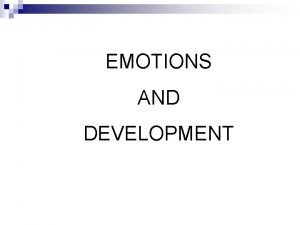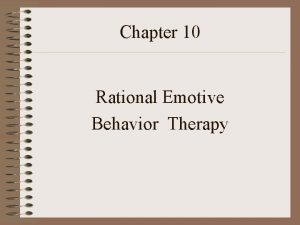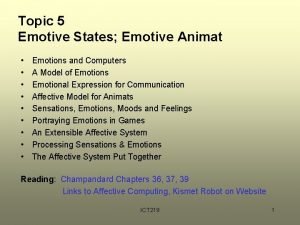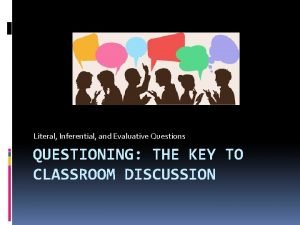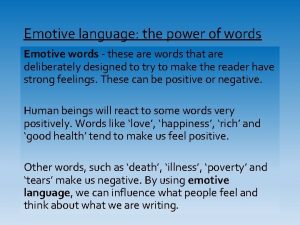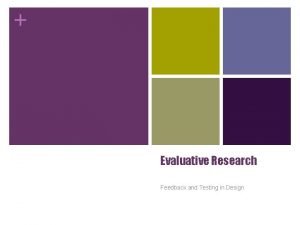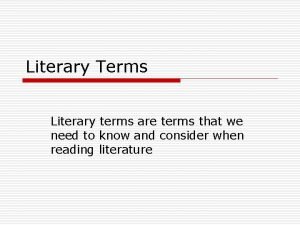THE USE OF EMOTIVE AND EVALUATIVE TERMS IN























- Slides: 23

THE USE OF EMOTIVE AND EVALUATIVE TERMS IN ARGUMENT: A SHORT-CUT TO UNDERSTANDING OR A DETOUR INTO FALLACY? Martin Hinton University of Łódź WILL TWO: Language and Argument Łódź, 11 th May 2018

PLAN OF THE TALK • Some theory – – Aristotle Gilbert Macagno Fallacies • Some examples – The corpus – Children • Some analysis • Some conclusions

SOME THEORY Emotions in Argument

ARISTOTLE No time for a long discussion, but… The inclusion of pathos in Aristotle’s theory of rhetoric as a legitimate form of appeal lends some respectability to the idea of emotional argumentation.

MICHAEL GILBERT – EMOTIONAL INFORMATION Gilbert states that ‘the utilization of emotion in arguments in part or in whole, is perfectly rational’ (Gilbert, 2004: 246) We are wrong to reject emotion when considering arguments because: ‘emotional messages do carry information rather than merely colour the dialectical information contained therein, and [. . . ] emotional information is used whenever we are convincing as well as persuading’ (Gilbert, 2004: 261).

FABRIZIO MACAGNO – CONDENSED ARGUMENT We should note that emotional phrases have a dual nature: ‘their logical functions as implicit and condensed arguments, and their rhetorical effect, consisting in arousing emotions’ (Macagno, 2014: 107). ‘Emotional reasoning is still a form of reasoning which can be assessed as grounded or not on shared premises [. . . ] Sometimes emotive words are needed in order to summarize in a condensed argument a more complex type of reasoning’ (Macagno, 2014: 118).

FALLACIES Emotive language can lead to fallacy in a number of ways: By replacing argument entirely By introducing irrelevant arguments – ad misericordiam By giving too much weight to certain factors By begging the question

EXAMPLE – UNDUE WEIGHT 3 innocent children have been brutally stabbed and left in agony to die on our streets this year alone. More money must be spent on Police patrols. Vs In a city of 20 million, only 3 minors have died from stab wounds in the last 12 months. Police patrols are sufficient.

EXAMPLE – QUESTION BEGGING Abortion should be illegal because it involves the murder of an unborn child. In a rational debate on abortion law this begs the questions twice: ‘murder’ means illegal, immoral killing; and a ‘child’ is a person, with rights. The legality of the killing and the status of the foetus are the questions in the debate and, crucially, are not part of Macagno’s ‘shared premises’.

CONCLUSIONS Emotive and evaluative language can carry ‘information’ useful in the assessment of an argument. It can also be seen as a way of condensing longer chains of reasoning, where certain evaluative premises are held in common by discussants. Naturally, emotion may also be used to hide the true nature of the argument, specifically its weaknesses, and thus lead to fallacy, but, crucially, the flaws in apparently fallacious emotional appeals will often depend on background value-based beliefs.

SOME EXAMPLES Politicians at work

A CORPUS A corpus of 50 addresses made by candidates in election debates in the USA and Poland was collected for a study: Dialogue with the Electorate in Polish and American Preelection Debates (Budzynska-Daca & Hinton, forthcoming). The speeches are all made by presidential and prime ministerial hopefuls between 1995 -2016. The corpus was analysed for various rhetorical features, including appeals to emotion.

CHILDREN The USA – Theme: Children Clinton, W. I think of the man who grabbed me by the shoulder once with 1 tears in his eyes and said his daughter was dying of cancer and Poland – Theme: Children Tusk 4 Children, grand-children, in order that grandparents and parents, I'll be a grandfather soon for sure, don't feel afraid that they'll be he thanked me for giving him a chance to spend some time with left in this country alone. her without losing his job because of the Family and Medical Leave Act. Kaczyński, We want there to be calm in schools, so that children aren't bullied Clinton, W. Whether we're going to give our families more protection for their 2 kids against drugs and tobacco and gangs and guns. Kerry 3 J. 2 by others. . . Duda 1 caring about the Polish historical memory, caring that amongst the young the basis of patriotism is nurtured the person who could be a commander in chief who could get your kids home Szydło 1 Mc. Cain 1 We have to stop the spending, which has mortgaged your children's futures. … you know, I can't put statistics in the pot and feed my children with them.

SOME ANALYSIS Unpacking arguments

BILL CLINTON ‘with tears in his eyes and said his daughter was dying of cancer’ The first expression contains ‘emotional information’. The tears are not simply sentimentality, they convey the importance of Clinton’s policy to people with sick family members. The second shows the importance of the issue as a whole. Many people have daughters, many people die of cancer. Arguing: good policies help people, my policies help people, so my policies are good, would not only be less effective, but also less informative.

JOHN MCCAIN Uses the phrase ‘mortgaged your children’s futures’ as a means to criticise current policy. The argument might have been laid out thus: P 1. Current levels of spending involve incurring large debts P 2. Paying off those debts will cause economic difficulties in the future Therefore, we should reduce levels of spending. Short-term sacrifice for future gain is not always popular, but for our children it is the norm. Thus, another layer of reasoning is added.

BEATA SZYDŁO The phrase ‘can’t put statistics in the pot’ encapsulates the very real political truth that average incomes and national employment percentages often mask a large number of the leftbehind. It is a clever rebuttal to the claims of the government, denying the second premise: P 1. Statistics show that the economy is currently strong P 2. You benefit from a strong economy Therefore, you should vote for the status quo

JAROSŁAW KACZYŃSKI Last, but not least… ‘so that children aren't bullied (terroryzowane)’ Arguing for school reform on this basis clearly implies that children are currently being bullied and that the organization of the system is partly responsible. The language that he uses is both emotive and precise – carrying more information than mere talk of ‘safety’ by specifying the threat. Also, the argument is condensed, since bullying is universally considered ‘a bad thing’. He runs no risk of seeming to overplay the emotional side as it is also known to be common.

BUT… Mitt Romney - ‘I'd like to be the next president of the United States to support and help this great nation and to make sure that we all together remain America as the hope of the earth. ’ America is not the hope of the earth, and even if it were, that is not a reason vote for Romney! This phrase shamelessly appeals to patriotic pride in place of an argument, not as part of one.

SOME CONCLUSIONS

1. Emotional and evaluative language can be used fallaciously or as a replacement for proper argumentation. 2. But, that does not mean all arguments employing such language are fallacious. 3. Gilbert and Macagno are supported by the examples – emotive language can carry relevant ‘emotional information’ and evaluative terms can act as ‘condensed arguments’ – provided certain background assumptions are held in common. 4. Argumentation theorists should be careful to distinguish the role of the emotion within the appeal.

REFERENCES • Budzyńska-Daca, A. & Hinton, M. (Forthcoming). Topika Dialogowania z Wyborcami W Polskich i Amerykańskich Finałowych Debatach Przedwyborczych. Studia Semiotyczne. • Gilbert, M. (2004). Emotion, Argumentation and Informal Logic 24, 3: 245 -264 • Macagno, F. (2014). Manipulating Emotions. Value-based Reasoning and Emotive Language. Argumentation and Advocacy 51: 103– 122

THANK YOU Please note: Phi. Lang 2019 Argumentation Workshop Łódź, 10 – 12 May
 Emotive and evaluative language
Emotive and evaluative language Like terms and unlike terms in polynomials
Like terms and unlike terms in polynomials Like terms
Like terms Emotive language
Emotive language How does repetition persuade the reader
How does repetition persuade the reader Emotive style communication
Emotive style communication Example of rhetorical question
Example of rhetorical question Emotive langauge
Emotive langauge Supportive communication style
Supportive communication style Rational emotive therapy example
Rational emotive therapy example Reflective communication style
Reflective communication style Emotive function
Emotive function Emotive language
Emotive language Emotive greeting cards
Emotive greeting cards Rational emotive imagery
Rational emotive imagery What is emotive language
What is emotive language Emotive language
Emotive language Contoh emotive words
Contoh emotive words Emotive language in newspaper articles
Emotive language in newspaper articles Bandwagon testimonial
Bandwagon testimonial Emotive topic
Emotive topic Solo talk ideas
Solo talk ideas Steps in systematic desensitization
Steps in systematic desensitization Inferential questioning
Inferential questioning








